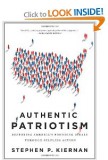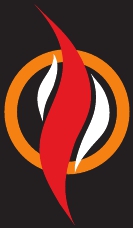Authentic Patriotism

|
Title | Authentic Patriotism |
| Author | Stephen P. Kiernan | |
| Reviewer | Claire Gaudiani | |
| Review Date | December 13, 2011 | |
| Publisher | St. Martin's Press | |
| Year | 2010 | |
| Rate this Book |
“Authentic patriots do not set out to change the world. They set out to solve a problem.” Meet some people who will make you deeply proud to be an American, whether you are a liberal progressive, a Tea Party member, or somewhere in between. Stephen Kiernan’s Authentic Patriotism focuses on the demands democratic republics make on their citizens. Optimism and patriotism have become loaded concepts in the past few years. That may be because the media focuses us on major politicians and celebrities. That leaves the rest of us to watch and listen, 24/7. We watch flat screens, whatever size. Kiernan snaps our sets off. He introduces regular people, citizens like Dr. Howard Freeman, Barry Scheck, and Majora Carter. Kiernan’s casts are doers, not watchers.
In a casual, engaging stroke, Kiernan floats the idea that citizens in a republic are supposed to be doers, not must watchers. Remember? Kiernan states his thesis halfway into oncologist-surgeon Freeman’s story.
The challenges that confront America today… have developed over the span of a generation, flourishing in peace as in war, worsening in good economic times and bad… You cannot build sustainable economic growth unless the benefits reach more than a fraction of the populace.
The problem, in its essence, is one of engagement. The American people are no longer fully engaged in the task of building a more perfect union. Their involvement in improving the condition of the country has waned, one person at a time, until most of the population considers that mission somebody else’s business.
Freeman traces his ancestry to the former slave—his great, great, grandfather, Walter. Walter had worked double shifts and hired himself out as a carpenter on the side to earn enough money to buy his freedom and that of this wife, Eliza and his five children. When he left the plantation for Washington, DC, an official asked Walter his last name. Walter replied, “I am a free man.” Hence, my last name, Dr. Freeman reports. Freeman decided that his work at Harlem Hospital demanded that he re-frame the treatment of breast cancer for his very indigent patients. His re-organization of prevention, diagnosis, and treatment was so successful in patient outcomes and in cost reduction that soon visitors from The Cleveland Clinic, Sloan Kettering and many other notable medical centers were coming to Harlem to learn Dr. Freeman’s approach. Freeman’s philosophy: “Each one of us is gifted…We each need to find our gift, whatever it may be, and we have to develop it so we can create a human benefit from within ourselves.” Kiernan identifies Freeman as an authentic patriot, his highest honor.
The stories of the other patriots unroll in a leisurely way. Kiernan steps away from preaching and lets the stories of citizens convey his message. Jack McConnell is a very successful doctor who retired to Hilton Head, SC and opened a free clinic, staffed by retired volunteer doctors and nurses. Previously underserved patients now received care that changed their lives. Jack’s story is a uniquely American story. He had to fight through the resistance of local medical professionals and insurance and licensing bureaucrats and then find available, affordable clinic space. Turns out that raising money was his easiest task.
Kiernan notes that “… the marketplace had been an obstacle to progress, but the forces of individual initiative had proved stronger.” McConnell’s words clarify the point: “If we had resources in place, we could provide much if not most of the service to the forty seven million that need it.” “I wouldn’t be surprised if we could provide three quarters of it.” He goes on. “We have two hundred and fifty thousand retired physicians in this country. We have more than twice that many retired nurses. They are trained; they are seasoned. Every day that goes by, we are wasting their expertise.” Kiernan lets the voices of Freeman and McConnell drown out the twit-babble that usually out-decibels everything. McConnell’s story and the statistics on increased health care and reduced health care costs re-affirm the power of individual Americans.
System change duplicates itself in countless sectors and geographies all over the nation. The nation needs more change from individual citizens. You might ask, why do we seem to believe that only Congress and politicians can address the country’s challenges; that only banks and corporations are credible forces? Kiernan muses on why but keeps reinforcing the idea that individual American citizens are and have always been the country’s best assets.
Some people like Barry Scheck permit Kiernan to tell hair-raising stories of innocent people accused and convicted of horrible crimes, usually by eye witnesses. Scheck was one of the first attorneys to use DNA evidence to exonerate the innocent. Kiernan’s journalist skills enable him to slide several compelling stories of miss-judged people, mostly Black men, into his narrative on Scheck. Alan Newton and Marion Coakley walk through the text from their wrongly assigned prison cells right to the sides of men like John Adams and David Souter. All of them bear witness to the commitment to justice that is the heart of America. The major story that emerges is the great power of that justice. Even in the face of the on-going dangers of capital punishment, and the continuing danger that Black men experience in police stations, courts, and at the hands of eyewitnesses, American justice fights to win out because individual citizens defend it. Skillfully, Kiernan celebrates the drive to equity and justice that perdures in America; yes, through institutions that preserve the rule of law, but importantly, through individuals willing to fight for justice when institutions fail.
Now if you are clucking that Freeman, Scheck, and McConnell are professional men with advanced education in law and medicine, with the equipment to be optimistic problem-solvers in America, give Kiernan a chance to continue. He introduces Majora Carter, born into serious poverty and now the champion entrepreneurial developer of Sustainable South Bronx. An amazing heroine in her own community, Carter arranges for education, jobs, environmental improvements, and both social and small business entrepreneurship for her fellow South Bronxsters.
Kiernan also tells an extensive set of stories about the power of individuals involved in organ donations in America. Kiernan introduces the humanity of the doctors, the staff, and the families involved in the giving and receiving of such generosity. The depth of personal generosity expressed in each case lit up a warm feeling of gratitude in me. Organ donors and their families and the professionals who surround them could save my child. Now I see why I should be a donor too.
The stories keep rolling. From every state in the Union, people at every age and income level seem to stand up briefly as authentic patriots making change—making America. The voices call out: if it isn’t perfect yet, get off the sofa and make your changes just like the eighth- grader from Waukee, Iowa did, as the Wall Street mogul and the thoughtful granddaughter did. Imagine sharing three hours a week to reinvigorate a sense of common purpose in America!
Kiernan closes with a straightforward, three page appeal to patriotism. His sentences are short. His syntax simple:
But this independent spirit is not the only one. The American Idea is also about unity. It includes interconnectedness, the shared endeavor of making democracy work; the Founders were mindful of unity. They made it iconic by putting E pluribus unum, from many, one—on our currency. They began the Constitution with “We, the people.”
The people have forgotten. Independence has foreshadowed unity. Common purpose has been usurped by isolation. License has displaced liberty. Government is not nimble. It is rarely inspiring. It is not responsive. It does not lead. We are all equal; everyone can make a difference; everyone is needed for the nation to thrive…
Kiernan’s authentic patriots and Kiernan himself are not tangled up in economic or sociological blather. The errors of our collective past (even our persistent bowling alone) are less in his lens than how we can each create a solution to an American challenge or propagate one developed by a Jack McConnell or a Majora Carter or a Barry Scheck. Kiernan only wants each of us to recognize an urgent need and do something about it…not a novel idea, but one most Americans need to be reminded of. Read this book.
Claire Gaudiani, PhD, publishes, speaks, and teaches about the history and economics of American philanthropy. She served for 13 years as president of Connecticut College. During her tenure at the Yale Law School, she wrote The Greater Good: How Philanthropy Drives the American Economy and Can Save Capitalism (Henry Holt/Times Books). She served as clinical professor at the Heyman Center for Philanthropy at New York University and is currently affiliated with NYU’s Wagner Graduate School of Public Service. Gaudiani’s current directorships include The Henry Luce Foundation, MBIA Inc., and The Council for Economic Education. Elected a fellow of the American Academy of Arts and Sciences, she is a recipient of the Rosso Medal for Distinguished Service to Philanthropy from Indiana University, ten honorary doctorates and three distinguished teaching awards.



